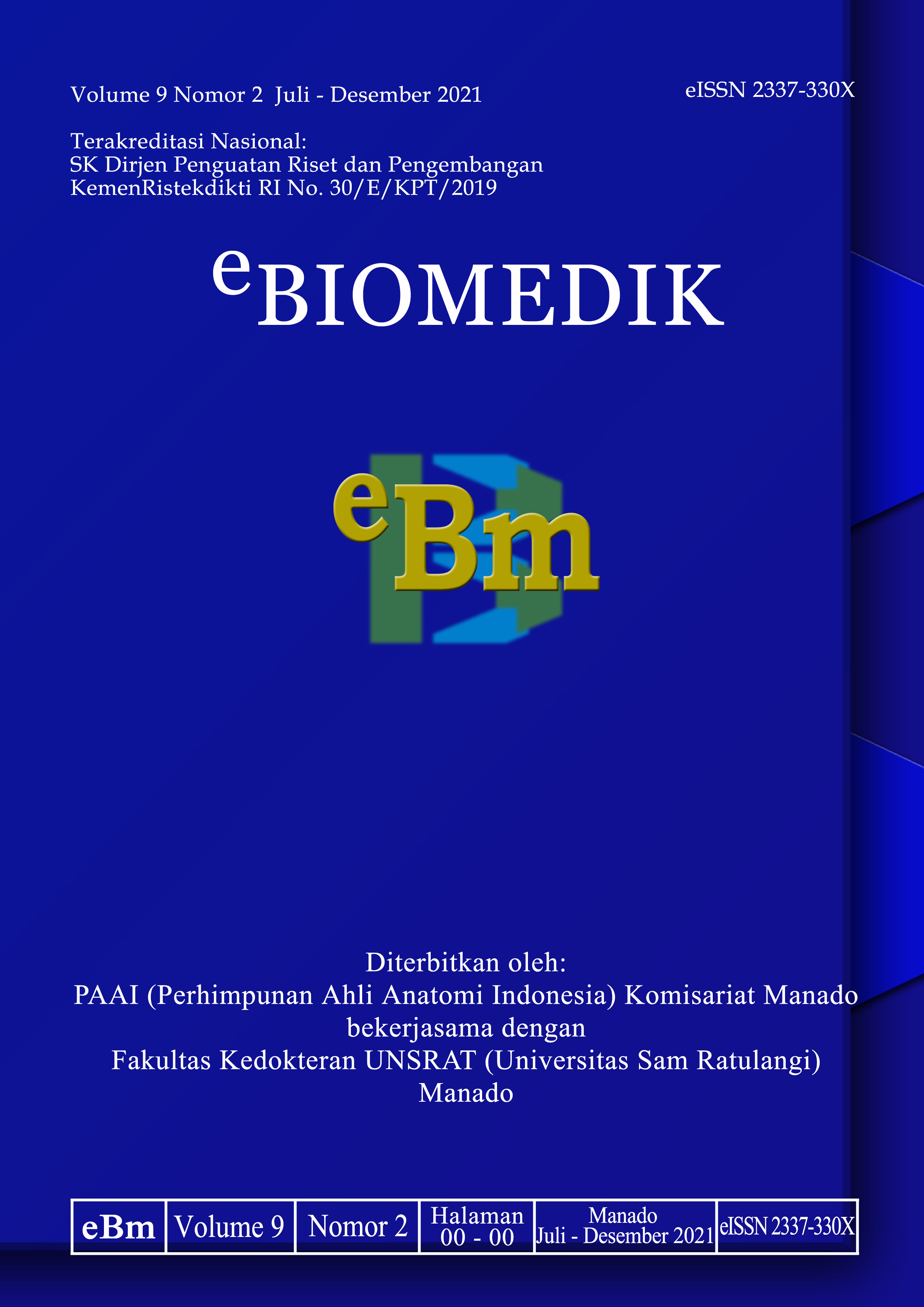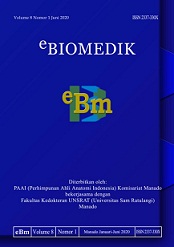Molecular Docking Terhadap Senyawa Kurkumin dan Arturmeron pada Tumbuhan Kunyit (Curcuma Longa Linn.) yang Berpotensi Menghambat Virus Corona
DOI:
https://doi.org/10.35790/ebm.v9i2.31888Abstract
Abstract: At the end of 2019 the world was shocked by the emergence of a new virus, namely the corona virus (SARS-CoV 2) which is called Corona Virus Disease 2019 or COVID-19. The origin of the emergence of this virus is known to have originated in the city of Wuhan, Hubei Province, China in December 2019.1 Research shows a close relationship with the corona virus that causes Severe Acute Respitatory Syndrome (SARS) which broke out in Hong Kong in 2003, until WHO named it the novel corona virus ( nCoV19). Turmeric (Curcuma longa L.) is a tropical plant that has many benefits and is found in many parts of Indonesia. Turmeric is widely used by the community as a traditional medicine to treat several diseases, such as: anti-inflammatory, antioxidant, hepatoprotective, and others. This study aims to determine the content in several compounds in the turmeric plant that have the potential to inhibit COVID-19 by using the molecular docking method. Using the In Silico method, namely molecular docking with the compounds taken were curcumin and ar-turmerone and the main protease COVID-19 (6LU7). This study obtained the binding affinity of curcumin compounds, namely -7.2 and Ar-turmerone -5.8 compounds against Mpro COVID-19. Remdesivir, which was used as a positive control, had a binding affinity of -7.7. In conclusion, remdesivir got better results compared to curcumin and Ar-turmerone compounds.
Keywords: Molecular Docking, Turmeric, COVID-19.
Â
Â
Abstrak: Pada akhir tahun 2019 dunia digemparkan dengan munculnya virus baru yaitu corona virus (SARS-CoV 2) yang disebut dengan Corona Virus Disease 2019 atau COVID-19. Awal mula munculnya virus ini diketahui berasal dari Kota Wuhan, Provinsi Hubei, China pada Desember 2019.1 Â Penelitian menunjukkan hubungan yang dekat dengan virus corona penyebab Severe Acute Respitatory Syndrome (SARS) yang mewabah di Hongkong pada tahun 2003, hingga WHO menamakannya sebagai novel corona virus (nCoV19). Kunyit (Curcuma longa L.) merupakan salah satu jenis tanaman tropis yang banyak memiliki manfaat dan banyak ditemukan di wilayah Indonesia. Kunyit banyak dimanfaatkan masyarakat sebagai obat tradisional untuk mengobati beberapa penyakit seperti: antiinflamasi, antioksidan, hepatoprotektor, dan lain-lain. Penelitian ini bertujuan untuk mengetahui kandungan dalam beberapa senyawa pada tumbuhan kunyit yang berpotensi menghambat COVID-19 dengan metode molecular docking. Menggunakan metode In Silico yaitu molecular docking dengan senyawa yang diambil adalah kurkumin dan ar-Turmerone dan main protease COVID-19 (6LU7). Penelitian ini didapatkan hasil binding affinity senyawa kurkumin yaitu -7.2 dan senyawa ar-turmeron -5.8 terhadap Mpro COVID-19. Remdesivir yang digunakan sebagai control positif mendapatkan hasil binding affinity yaitu -7.7. Sebagai simpulan, remdesivir mendapat hasil yang lebih baik dibandingkan dengan senyawa kurkumin dan ar-turmeron.
Kata Kunci: Molecular Docking, Kunyit, COVID-19.





